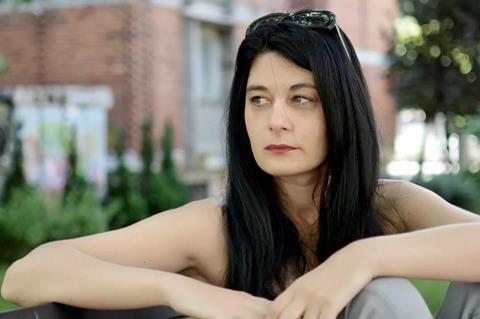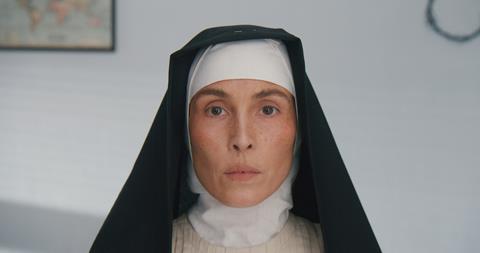
Venice title Mother, a “feminist punk” biopic of Mother Teresa, starring Noomi Rapace and Sylvia Hoeks, and featuring the music of Finnish rock band Lordi, was 12 years in the making for Macedonian producer Labina Mitevska, her sister, the film’s director Teona Strugar Mitevska, and their production designer brother Vuk Mitevski.
The family affair was produced through the family-run outfit Sisters And Brother Mitiveski and required all of Labina’s skills as a coproducer to bring it to the screen.
The film made its world premiere as the opening film of Venice Horizons in late August but its journey began in 2012 when the sisters were asked by a Macedonian broadcaster to make a documentary called Mother and I, about the Catholic nun Mother Teresa, who was born in Skopje as Anjezë Gonxhe Bojaxhiu, and who worked for decades ministering to the poor in Calcutta. She died in 1997 and was canonised by the Catholic Church in 2003.
Labina and Teona travelled to India and contacted Missionaries of Charity, Mother Teresa’s organisation. However, Missionaries of Charity was reluctant to deal with the media following the UK-produced documentary Hell’s Angel in 1994 in which UK journalist Christopher Hitchens had lambasted Mother Teresa and the quality of medical care she offered to the poor and sick.
It took six months to gain permission to talk to four living sisters who had known Mother Teresa. In their time researching the woman behind the icon, the sisters learned Mother Teresa. was very different from her public persona. ”She was much tougher,” says Labina. “Like a president of a company. She built an army of women who were going around the world to help.”

Following the documentary, Teona decided to make a movie about Teresa in the seven- day period of the late 1940s, just before she set up her order, when she was still having doubts but was determined to help those starving and dying on the streets. “We were interested in representing her as a human,” Labina explains.
“Throughout history, we always watch films about men,” the producer adds. “The world is so bad today that we need films about inspirational women characters.”
They persuaded Macedonian novelist Goce Smilveski, to work on an early draft of the screenplay and Labina connected with a potential Belgian co-production partner in Sébastien Delloye from Entre Chien Et Loup, who she knew through producers’ network EAVE.
“I told him this is too big a project for me to do myself,” she explains. “We started developing together.”
After securing an initial €45,000 from the EU Media programme, they cast Swedish actress Rapace to play the lead and were able to look for Swedish partners.
Financing for the €4m film was pieced together from multiple sources including the North Macedonia Film Agency, Centre du Cinéma et de l’Audiovisuel de la Fédération Wallonie-Bruxelles, the Swedish Film Institute, the Danish Film Institute and the Cinematography Foundation Sarajevo. Further support from the Belgian tax shelter, with Frau Film in Denmark joining as coproducer, with Rainy Days Productions and Film I Vast.
It was important for the Mitevska sisters to have Indian involvement, and Raging Films in Calcutta proved robust partners. Interiors were shot in Belgium but all the exteriors were shot on location in India in a gruelling 12-day shoot in Calcutta. The filmmakers received around €120,000 in Indian tax shelter funding.
“We were one of the first films [to use it] and it is working so well,” said Labina. “We were very sceptical because it had just been introduced but it was fantastic.”
French sales agent Kinology came on board at an early stage. “When we started the film, we really needed an MG,” says Labina, who describes Kinology founder Gregoire Melin as a real creative partner who helped to “shape the film”.
Post-production was done in Sweden, Denmark and Belgium. The film went through the Berlinale Co-production Market 2022 and also won a development grant from France’s Arras Film Festival.
Kinology pre-sold the film to key territories including France (Nour Films), Benelux (September) and Scandinavia (Scanbox).
Labina credits her passion for coproduction to the very start of her career, when she acted alongside UK star Katrin Cartlidge in Milcho Manchevski’s 1994 feature, Before The Rain. The Oscar-nominated feature was supported by British Screen Finance, under its chief executive Simon Perry, and was put together with backing from French, British and Macedonian sources.
“Simon Perry believed so much in the European cinema,” she recalls. “For me as a 17-year-old girl who loved art, it was such a discovery. Coming from a small country that lacks financing, I realised we can still do creative coproductions.”















![[L-R]: Amanda Villavieja, Laia Casanovas, Yasmina Praderas](https://d1nslcd7m2225b.cloudfront.net/Pictures/274x183/6/4/1/1471641_pxl_20251224_103354743_618426_crop.jpg)








![[L-R]: Amanda Villavieja, Laia Casanovas, Yasmina Praderas](https://d1nslcd7m2225b.cloudfront.net/Pictures/100x67/6/4/1/1471641_pxl_20251224_103354743_618426_crop.jpg)
No comments yet